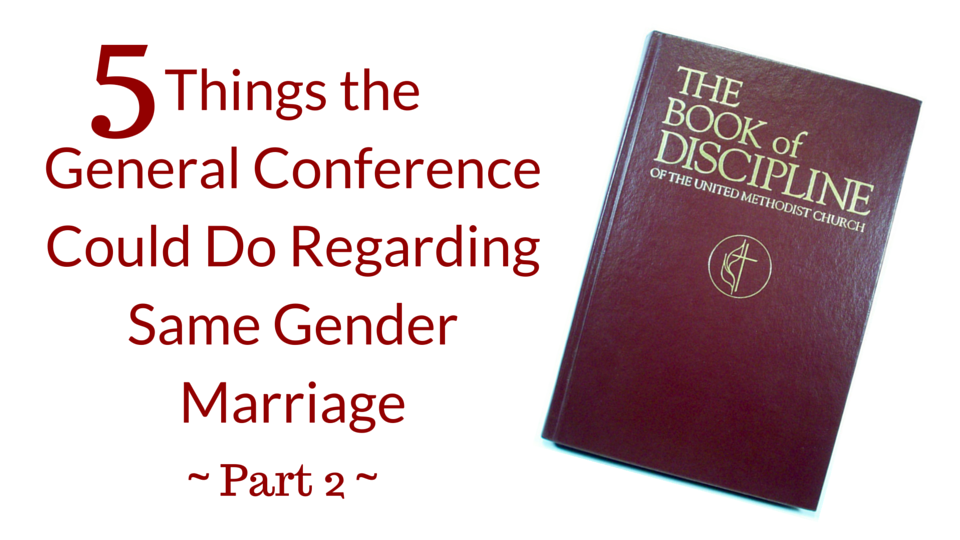Five Things the General Conference Could Do Regarding Same Gender Marriage — Part Two

Today's post is Part Two in a series. You can read Part One here. As General Conference begins this week in Portland, so much of the focus will be on the debates regarding the church’s position on homosexuality. If I could wave a magic wand, I’d remove all references to homosexuality from The Book of Discipline (which was how The Discipline read prior to 1972). Imagine the United Methodist Church without the incessant fighting over homosexuality; we might actually focus our attention on “making disciples of Jesus Christ for the transformation of the world.” But given that this is an unlikely outcome at this General Conference, here are five things I hope the General Conference might do in the next eleven days: 1. At minimum we should insert in the Discipline, both at Paragraph 161F and at Paragraph 304.3 that “United Methodists are deeply divided on the issue of homosexuality, but at this time a simple majority of General Conference delegates hold that the practice of homosexuality is incompatible with Christian teaching. …” This insertion acknowledges where a significant minority of United Methodist stand. Additionally, a similar insertion should be made as a footnote at the bottom of page 110 in the Discipline at paragraph 161F where the sentence reads “… only within the covenant of monogamous heterosexual marriage.” I’ve heard from some conservatives who would support this, as would most moderates and progressives in our churches. 2. A second change would be to replace the “incompatible” language with something that is not so painful to gay and lesbian people and their family and friends. If the General Conference intends to maintain a conservative position on homosexuality, I would suggest we replace the incompatibility sentence at 161F and 304.3 with something like the following: “United Methodists are deeply divided on the issue of homosexuality, but at this time a simple majority of General Conference delegates hold that same gender sexual relations are not God’s intended will for human sexuality.” Again, many conservatives understand the need to find a better word to describe their position than “incompatible.” 3. A third step that the General Conference could take that would require minimal changes in the Discipline would be to eliminate from the list of “chargeable offenses” in paragraph 2702 the words, “conducting ceremonies which celebrate homosexual unions; or performing same-sex weddings.” This would not change the official position of the church, but it would encourage bishops and Boards of Ordained Ministry to find other ways of addressing violations of the Discipline regarding same-gender weddings. Church trials for officiating at same-gender weddings harm our witness to the broader community and are likely to become increasingly ineffective as a means of enforcing the Discipline. If we did these first three, it would be an important conciliatory step for healing the divide in the United Methodist Church. Yet these three are just a short-term fix. Here are two more changes that I believe should be made at this General Conference and which would have a very positive longer term impact upon the church: 4. Make the United Methodist Church in the United States a Central Conference, just as United Methodists outside the U.S. are organized into Central Conferences. With this change, the General Conference should grant all Central Conferences greater autonomy as they adapt Part VI of The Book of Discipline to best serve the needs of their mission and context. We already make allowance for some adaptation of this part of the Discipline in the Central Conferences. There are many important reasons to approve this aside from any connection to the debate about human sexuality, but I do hope that this structure would allow each Central Conference to have their own debate about human sexuality in their particular context. 5. Finally, I hope General Conference would stop trying to set wedding policy for local churches and clergy. Paragraph 340.3 is right to say that, “The decision to perform the [marriage] ceremony shall be the right and responsibility of the pastor.” Let local church pastors decide who they will and will not marry and protect that right going forward. This would guarantee that conservative pastors would never be required to officiate at same-gender weddings. But it would also allow those who hold different convictions to officiate at such weddings. To accomplish this, paragraph 341.6 would simply be removed. This is a part of the Connectional Table proposal. I’ve only addressed same-gender marriage in this post. I agree with the recommendation of the Connectional Table that the Annual Conference is responsible for ordination and that annual conferences, not the delegates of General Conference, should be determining who they will or will not ordain. In my next post, which I’ll post after the first five days of General Conference, I’ll offer a few words about what is likely to happen if nothing changes at this General Conference.